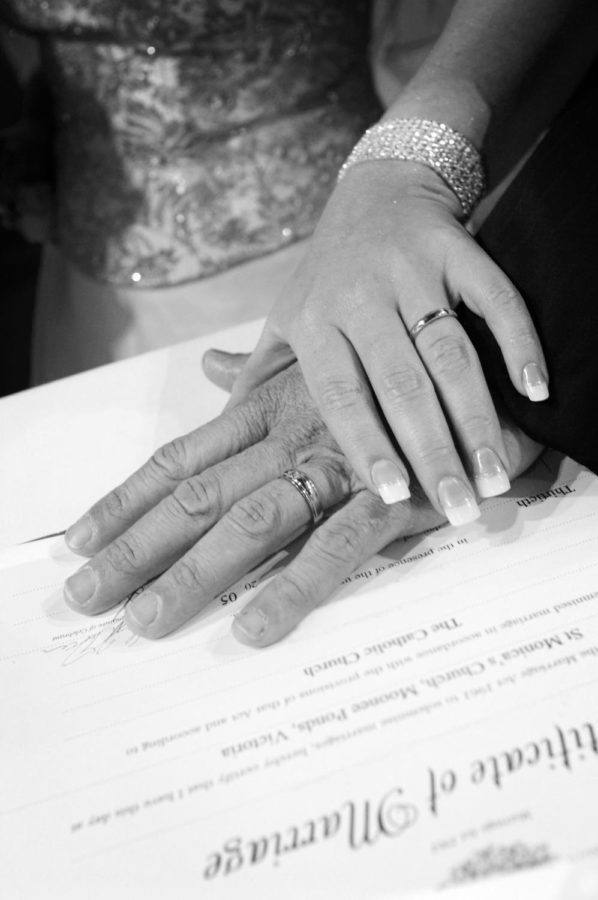Brown: Marriage is just another contract
Because marriage is so closely tied to the U.S. government, laws regarding it should not be affected by religion. The legal aspects include documents and benefits for two people becoming one union.
February 4, 2013
Many people believe marriage is a celebration of love and devotion. Others think it is a sacred contract. Some consider it an exhilarating drunken activity (looking at you, Las Vegas), and still others think of it as a death sentence of sorts.
Whatever our opinion on marriage, one thing is certain: If you’re getting married in the United States, the government is involved.
The origin of the relationship between marriage and government certainly predates the United States, but holding true to tradition, we have kept that relationship strong. Marriage licenses are signed by any couple wishing to be recognized by the government as married, usually in a less-than-romantic ceremony involving a couple of dotted lines, an ID, and, here in the state of Iowa, $35 in cash and a county recorder.
The reasons for marriage — which tends to be thought of as a rather intimate relationship — being regulated by the government are not perfectly clear. Certainly, our system of taxes allows for “benefits” to being married, mostly in terms of re-assessing economic standing.
The classic notion that “first comes love, then comes marriage, then comes the baby in the baby carriage” alludes to marriage being equated with children. Government incentives to marry, then, were incentives to procreate. Certainly, when government first became involved in the regulation of marriage, the world was a much bigger place. Overpopulation concerns were either nonexistent, or at least only on local scales.
Out of all the reasons a government could have to regulate marriage, one commonality is clear: The married couple is treated as a single entity. That is the purpose of marriage, after all. Pledging to live one’s life with another is all we can really do short of surgery to become one with another human being.
Of course, the whole “for life” part is not really a requirement of the state. To government, marriage is effectively a contract declaring that two individuals wish to be addressed in many, but not all, ways as one. As with any contract, a marriage can be rescinded, although in most states this must be done before another marriage can be recognized.
Government therefore has a completely legitimate interest in regulating marriages. Just as citizens of the United States have a legal name and a legal date of birth, they have a legal marriage status. In 1996, however, the federal government took its regulation of marriage a step further.
The Defense of Marriage Act of 1996 declared legally that no state must recognize same-sex marriages from another state, and that the federal government does not recognize same-sex marriages for both federal and international purposes. Signed into law by President Bill Clinton, who has since reversed his stance on federal recognition of same-sex marriage, the Defense of Marriage Act codified government discrimination.
That discrimination is undeniably true, although some would argue that it is warranted. To many people in this country, it is a legitimate interest of the state to ban, or at the very least to not recognize, same-sex marriages.
Reasons for disagreeing with the idea of same-sex marriage are diverse, but most have to deal with one of three main points. First, marriage is for heterosexual couples and any other use would lessen the integrity of the institution. Second, marriage was designed for procreation, and same-sex couples are in some way less effective parents. Third, marriage is a religious institution, and the government cannot interfere with religious groups.
The first two points are legitimate concerns that cannot simply be dismissed, although they can be countered, while the third point is simply nonsense. As amply described earlier, marriage is now a legal contract, regardless of its historical implications. Any religious control of a legal institution is unconstitutional.
As far as the integrity of marriage is concerned, since the argument stems from a personal judgement, it cannot be proven wrong. It can, however, be proven irrelevant. Again, marriage is a contract. As such, any third party seeking legal standing to intervene must demonstrate a clear vested interest. Since integrity is subjective and marriage is financially ‘beneficial,’ it would be like McDonald’s asking to ban the sale of Burger King food on grounds that it was ruining the integrity of hamburgers.
To address the issue of procreation, regardless of historic implications, marriage is a contract that now does not equate to procreation. According to a recent Economist article, 41 percent of births were to unmarried women.
With regard to parenting, an irrelevant personal judgement is again being made. In the United States, people can and are encouraged to report abusive, neglectful or otherwise unfit parents to the authorities, but it is not within the power of the state to proactively say who can and cannot raise children.
Ultimately, just like jointly owning a corporation, marriage is a legal matter, and as such, should not be subject to the discriminatory attitudes or the belief structures of those not involved.
——————————————————————————————-
Phil Brown is a senior in political science, biology and environmental studies from Emmetsburg, Iowa.

















